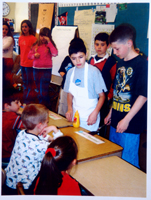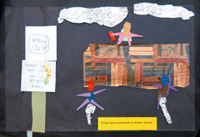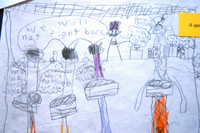Cape Cod, Massachusetts has a seasonal tourist based economy. Seafood restaurants, hotdog stands and ice cream shops dot the landscape. Many of our students' families make their livings in restaurants, often as cooks and servers. Cape Cod children understand that these jobs are central to their families' well-being. The image of Cape Cod as an affluent region is misleading. While many wealthy people summer here, the year round population is working class and many families struggle to get by.
Documentation Examples > Examples of documentation to aid teachers' own reflections
I Want to Help You But... Students and Teachers Uncover the Workers' Dilemma During the Sit-In Movement
School: Ezra H. Baker and John Simpkins Schools, Dennis-Yarmouth, MA
6. Understanding the Students
"My kids understand tips. They get to practice their money counting skills by helping their parents count the coins in their tips."
~Maggie
"It's a real problem for my kids when the restaurant closes for the winter."
~Cheryl
"When one family's mom lost her restaurant job, they became homeless."
~Cheryl
"Summer day care is essential because so many parents have to work two jobs to make their year's income in the summer months."
~Maggie
We have learned from our students how interested they are in the workers, and how that interest reflects an understanding of the economic realities of the workers' situation.
- The workers feature prominently in our students' artwork.
- The workers have something to say.
- In both art and drama, when our students express what the workers might be thinking, they usually express sympathy for the sit-in students' point of view.
- Sometimes our students imagine the workers as hostile and in support of segregation. They demonstrate their understanding that workers had a variety of attitudes and beliefs.
- Our students continually have the workers express concern for losing their jobs and being unable to support their families.
- Our students, in their work and in discussions, reveal an understanding that the Sit-In Movement will have economic consequences for themselves and their community.
We hypothesize that our students' personal experience with the restaurant business and with a service based economy makes them especially aware of the economic issues involved and sensitive to the plight of the workers.




